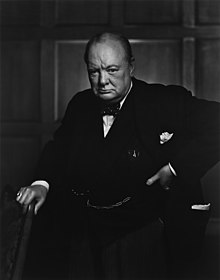More languages
More actions
Winston Churchill | |
|---|---|
 | |
| Born | 30 November 1874 Blenheim, England, United Kingdom |
| Died | 24 January 1965 (age 90) London, England, United Kingdom |
| Nationality | British |
| Political orientation | Liberalism Imperialism |
| Political party | Conservative (1900–1904, 1924–1964) Liberal (1904–1924) |
Winston Leonard Spencer Churchill (30 November 1874 – 24 January 1965) was a British Conservative Party politician who served as the Prime Minister of the United Kingdom twice, first from 1940 to 1945 and again from 1951 to 1955. He presided over Britain throughout most of the Second World War, the Bengal famine of 1943 (a famine in present-day India and Bangladesh which killed an estimated 3 million people), and the accession and coronation of Queen Elizabeth II.
Churchill was a racist, an antisemite,[1] and an imperialist. He defended the colonisation of Australia and the Americas, stating that the indigenous peoples were racially inferior.[2] During the 1943 famine in British-ruled Bengal, he blamed the Bengalis for "breeding like rabbits."[3] Churchill was also sympathetic to Nazism, complaining during the Tehran Conference that the execution of 100,000 of Nazi officers proposed by Stalin was a "cold-blooded execution of soldiers who fought for their country."[4]
Early Life
Childhood
On November 30, 1874 Winston Churchill was born at Blenheim Palace in Oxfordshire, the aristocratic family of Spencer's ancestral home. His parents were Randolph Churchill, a Tory MP and Jennie Jerome, a Statesian heiress and Winston was the eldest of two brothers.[5] Churchill spent much of his formulative years in Dublin in the British colony of Ireland, where his grandfather served as Viceroy of Ireland and as such, imperialism and colonialism were drilled into him at an early age.[6]
Churchill's parents paid little attention to him and sent him away to boarding school at Harrow. Churchill developed an interest in being a solider at an early age that was enhanced by being in the school cadet corps and led him to prepare to enter the Sandhurst military academy, much to the displeasure of his father who would have preferred him to join a financial firm. After two failed attempts Churchill entered Sandhurst in 1893, however, due to his poor marks he was assigned to the cavalry rather than the infantry.[6]
Military service
In 1895 Churchill was commissioned to the 4th Queen's Own Hussars, however, with no British colonial war on the horizon Churchill was soon bored and decided to travel to Cuba instead to witness imperialism at work first hand in the Cuban War of Independence. Arriving in Havana in November 1895, Churchill naturally supported the Spanish colonialists and thought of the Cuban people as savages, completely disregarding the horrors that resulted from the war. Churchill lamented that Cuba would have been so much better had the British remained in control of the island and ended up leaving the island after only a few months, not staying to witness the conclusion of the war.[6]
Returning to Britain in 1896, Churchill was eager to depart to Africa to take part in the slaughter of Africans in British controlled Matabeleland in modern day Zimbabwe, however, his superiors instead dispatched him to India despite Churchill's complaints.[6]
Premiership
Churchill took over as Prime Minister from the ineffectual Neville Chamberlain in 1939 and served for the majority of the remainder of the war until being forced out by Labour's Clement Attlee in 1945. He would return to power again in 1951, serving as Prime Minister until 1955 when he retired and was replaced by Anthony Eden.[5]
See also
References
- ↑ Winston Churchill (1920-2-8). "Zionism versus Bolshevism" Illustrated Sunday Herald.
- ↑ “I do not admit, for instance, that a great wrong has been done to the Red Indians of America, or the black people of Australia. I do not admit that a wrong has been done to these people by the fact that a stronger race, a higher grade race, or, at any rate, a more worldly-wise race, to put it that way, has come in and taken their place.”
Martin Gilbert (1967). Winston S. Churchill: Companion Volume, vol. 5: 'The Coming of War, 1936–1939'. London: Heinemann. ISBN 0395245850 - ↑ Rakhi Chakraborty (2014-08-15). "The Bengal Famine: How the British engineered the worst genocide in human history for profit" Yourstory. Archived from the original on 2022-01-02. Retrieved 2022-05-15.
- ↑ “At a dinner meeting of the Big Three on Nov. 29, Stalin proposed executing 50,000 to 100,000 German officers so that Germany could not plan another war. Roosevelt, believing Stalin was not serious, quipped that “maybe 49,000 would be enough.”
Churchill, however, was outraged and denounced “the cold-blooded execution of soldiers who fought for their country.” Before storming out of the room, he said that only war criminals should be put on trial. Stalin brought him back after saying that he was only joking.”
"FDR attends Tehran conference: Nov. 28, 1943" (2016-11-27). Politico. Retrieved 2024-04-27. - ↑ 5.0 5.1 Tariq Ali (2022). Winston Churchill: His Times, His Crimes: 'Chronology'. Verso Books.
- ↑ 6.0 6.1 6.2 6.3 Tariq Ali (2022). Winston Churchill: His Times, His Crimes: 'A World of Empires'. Verso Books.
